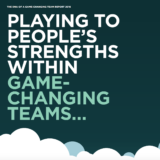Game-changing teams for transformational change
Not everyone is a game changer but everyone can make a game-changing contribution. FreeUp’s co-creation team includes all game-changing roles, including the key role of the “Play Maker”. Here is a summary of an inspiring report commissioned by eg.1: “The DNA of a game-changing team”.
Many organisations are driving their vision through innovation, often in quite a controlled way, by investing in innovation hubs, labs, processes and programmes. However, in order to survive and succeed over the long-term, organisations must consider the challenge of re-defining themselves and the ways in which they operate in the rapidly evolving global economy. It’s not enough to simply look to continuously improve existing products and processes, but it’s also needed to challenge ourselves to invent, implement and execute creative and transformational change.
“For real sustainable growth and success, we need people whose insights, visions and actions really change things. They are more than simply high flyers from the talent group. They are not just disruptive either. They seem to be different. They are called game changers.” Adrian Furnham, “The anatomy of a game changer”
Game changers have the potential to really motivate and inspire others while displaying incredible work ethic and dedication; but only when others understand how and what they can contribute. Change, for many, at the best of times, provokes anxiety. Radical change, driven by intense people who care little for conformity, will often be met with resistance. Individuals with strong game-changing inclinations feel constrained by bureaucracy, they don’t feel management takes them seriously, nor do they feel free to express themselves – all of which is very important to them.The data shows that individuals with very strong game-changing inclinations have a strong drive for expression, even at the risk of failure. They are also aware that this drive can alienate others but that is less important than trying; they are prepared to take that particular risk. It is these capabilities which often underpin creative and successful start-up businesses, facilitate growth and development, and drive transformational change.
Transformational change, and the success that comes with it, depends on game-changing teams. In the modern world of business, it can be hugely frustrating, even futile, being an imaginative and innovative thinker unless you have a team around you to help achieve the possibilities that you see in your world. While game changers are important, so too is the team around them; it is the whole team that makes things happen and ensures the symbiotic relationship between ‘business as usual’ and ‘transformational change’.
How to transform individual action into collective power? Businesses need to change the game and create a ‘safe to fail’ culture, where individuals are recognised for the contribution they make. Historically, the view of leadership has been a set of largely homogenous definitions of ‘high potentials’ and the ‘ideal leader’. The message of “The DNA of a game-changing team”: leadership is not a one-dimensional set of behaviours. In order to achieve a game-changing team, the view on leadership needs to be flexible; it needs to respond to the demands of a situation.
Game-changing teams are inclusive at all levels and enable everyone to contribute to the team and the future direction of their organisation. A team will vary, depending on the objective, but the key roles can be defined and measured by The GC Index (www.thegcindex.com), a tool to facilitate game-changing teams and cultures. Each of these roles will lead in different ways and provide a truly multi-dimensional view of leadership for the modern world of work: the Game Changer, the Strategist, the Implementer, the Polisher and the Play Maker.
 All five roles are of equal importance within organisations, but it’s the Play Maker who can really help create game-changing teams. Play Makers derive satisfaction from getting the very best from others. They have an ability to understand how different people can contribute. They are open to game-changing ideas and know how to get other people on board, by building effective relationships as well as getting tasks done.
All five roles are of equal importance within organisations, but it’s the Play Maker who can really help create game-changing teams. Play Makers derive satisfaction from getting the very best from others. They have an ability to understand how different people can contribute. They are open to game-changing ideas and know how to get other people on board, by building effective relationships as well as getting tasks done.
“Ground breaking creativity and innovation may lie with one individual. But it’s only a game-changing team that can achieve transformation that has longevity.” The DNA of a game-changing team

